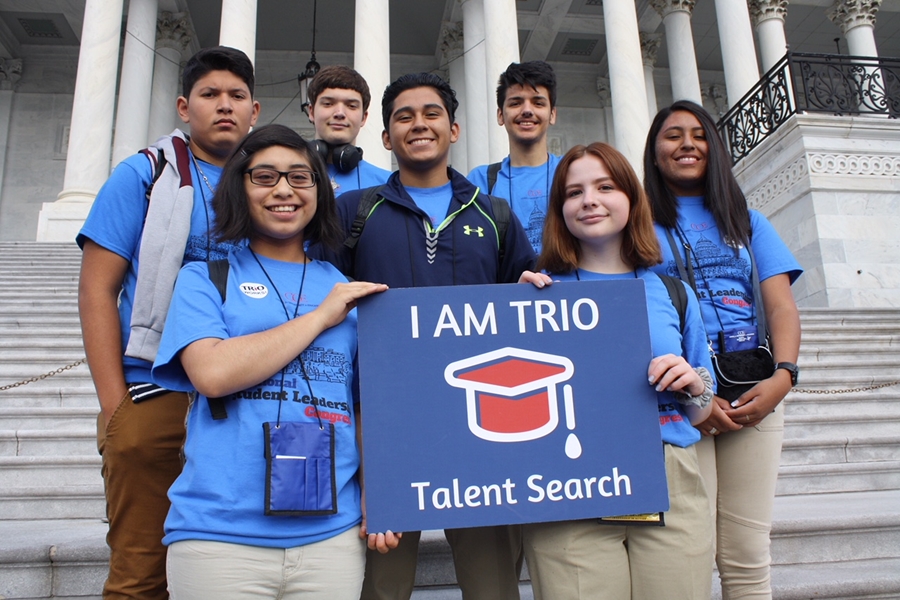
FAYETTEVILLE, Ark. – A group of seven local high school students in the University of Arkansas Talent Search program took part in a “mock” legislative session in Washington, D.C. as part of the week-long National Student Leadership Congress.
The local students in the program were:
- Melissa Alvarado of Springdale High School
- Ariel Blair of Mountainburg High School
- Rogelio Cardenas of Lincoln High School
- Dylan Cedotal of Gentry High School
- David Jurado of Rogers Heritage High School
- Aracely Najera-Hernandez of Springdale High School
- Raphael Perez of Berryville High School
They were among nearly 200 high school student delegates from around the country who are working to be the first in their families to attend college while using the Mock Congress experience to develop their leadership skills.
During the session the students examined current policy issues such as net neutrality, human cloning, border security and online privacy, discussing viewpoints for and against those issues, and researching, writing, debating and developing legislative bills.
The National Student Leadership Congress is a leadership experience for rising juniors and seniors in the federal TRIO programs, including Talent Search. Student delegates are nominated by their local TRIO directors because of their leadership potential.
“To really drive home the values of democracy and citizen participation, it’s important to engage students in activities that target their current issues of concern,” said Maureen Hoyler, CEO of the non-profit Council for Opportunity in Education, which sponsored this week’s event. “NSLC gives these students with high potential the leadership skills that will enable them to compete academically and to participate fully in our democratic society.”
During the program the students lived on the Georgetown University campus, engaged in conflict resolution workshops and diversity training and visited historical and cultural sites. They also met their senators and representatives on Capitol Hill. The program is in its 29th year.
The week-long session drew rave reviews from the local students.
“I was able to surround myself with intelligent, open-minded, diverse and kind people for five days,” said Ariel Blair. “I will never forget how these people impacted my views and my life.”
Aracely Najera-Hernandez agreed: “Participating in NSLC was amazing. Not only did I get to meet others, but I grew as a leader too. I made lifelong relationships"
“I learned that people care.,” said Dylan Cedotal. “It has shown me how to be more confident in my abilities and how to work well with a team. I made a lot of friends and I’m going to miss them.”
“NSLC was a once in a lifetime experience,” Rogelio Cardenas said. “It truly is a great program. Getting the ability to meet and see such diversity really does open your mindset.”
All of the students agreed the program helped them grow as students and as potential leaders.
“It was a heartfelt experience where lives were changed, friends were made, and leaders blossomed,” said David Jurado.
“NSLC taught me how to influence others with great impact.” Raphael Perez added.
Melissa Alvarado said “Getting to go to Washington D.C., meeting other students, creating bills based on real world problems, there won’t ever be an experience as amazing as this.”
In addition to the student delegates, University of Arkansas Talent Search staff members and academic advisors Xong Lor and Daizy Andrade were among those selected nationally to serve as NSLC mentors.
The Council for Opportunity in Education is a nonprofit organization established in 1981, dedicated to furthering the expansion of college opportunities for low-income, first-generation students, and students with disabilities in all 50 states, Washington, D.C., the Pacific Islands, and Puerto Rico. Its membership includes more than 1,000 colleges and agencies. Through its numerous membership services, COE works in conjunction with colleges, universities, and agencies to help first generation students enter college and graduate. More than a million students each year receive college access and retention services through COE’s member colleges and agencies.
Talent Search Programs is a department in the University of Arkansas Division of Student Affairs, funded by three U.S. Department of Education grants.
Contacts
Gina Ervin, director
UA Talent Search Programs
479-575-7949,